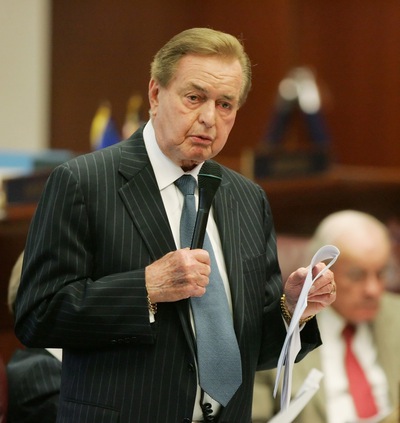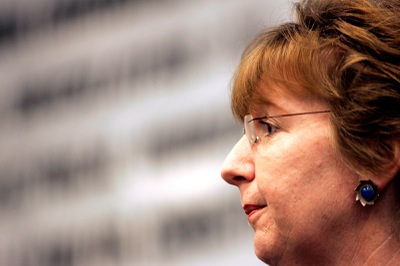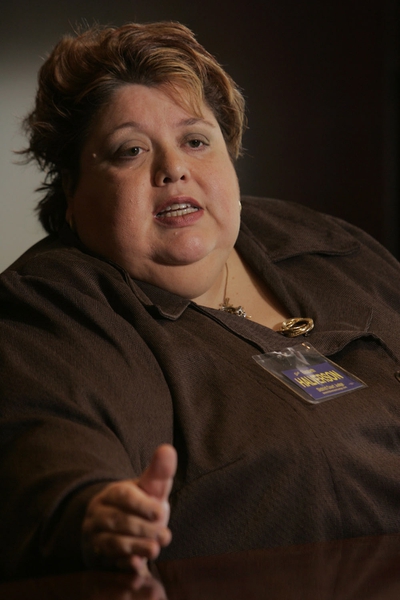Saturday, June 6, 2009 | 2 a.m.
Sun Archives
- Judicial selection bill advances (6-5-2009)
- Bills on judges, child sex crimes among several to advance (5-21-2009)
- Nevada lawmakers advance bills (5-20-2009)
- Appointed judges proposed (2-23-2009)
- Halverson loses bid to stay on bench (8-12-08)
Sun Coverage
Scarcely noticed in the final days of the Legislature was the approval of a plan to appoint rather than elect state judges.
If voters say yes to the plan next year, advocates say, Nevada would greatly reduce the chance that someone as unqualified as Elizabeth Halverson would ever don a black robe. Instead of allowing any lawyer to enter a judicial race, Nevada would have a selection panel recommend candidates to the governor. Voters would later decide whether to let the appointees continue to be judges.
The proposed constitutional amendment would inject a healthy dose of screening into a process that is now scattershot and heavily reliant on campaign donations from lawyers and others who have business before the courts.
Battle lines for the November 2010 ballot initiative have yet to be drawn, but one of the leading combatants will be Senate Minority Leader Bill Raggio, R-Reno, who has fought for nearly a quarter-century to turn the judicial selection process into one based on merit and court experience.
“We need to get the message across to the public that this is really an improvement in the way judges are selected,” said Raggio, 82, the longest-serving state senator in Nevada history. “This goes a long way toward restoring respect for the judiciary.”
Raggio, a former prosecutor, said advocates of the appointment process expect to enlist the help of retired U.S. Supreme Court Justice Sandra Day O’Connor who, as a state senator, helped steer Arizona to a merit system patterned after the process first adopted by Missouri voters in 1940.
O’Connor sent Nevada lawmakers a letter in April expressing her support for the Senate joint resolution the Legislature later passed.
“An appointment process for judges followed by periodic retention elections offers clear advantages over judicial elections,” O’Connor wrote. “Citizens can be confident that appointed judges are insulated from special interests who would seek to buy justice through campaign donations.”
Assembly Speaker Barbara Buckley, D-Las Vegas, a lawyer who is weighing a run for governor in 2010, also is backing the ballot initiative.
“I support it because too often I see people who don’t know who they are voting for,” she said. “And we certainly have seen some examples recently of folks who have not done a very good job. They have become poster children for the argument that it makes more sense to have experienced, thoughtful jurists on the bench.”
Buckley said that for the most part public opposition at the Legislature came from the smaller rural counties, where voters know their judicial candidates better and don’t want to give up their right to vote.
Ultraconservative organizations, such as the Nevada Eagle Forum, have spoken out against the change, contending the appointed system takes the power away from the people and puts it in the hands of a small group dominated by the legal community.
But the opposition also has some heavyweights in its corner, including longtime Republican consultant Sig Rogich, who is his helping lure Republicans to support next year’s reelection campaign of Nevada U.S. Sen. Harry Reid, the influential Democratic majority leader.
“I don’t think the Nevada voters will allow a select few to pick judges,” said Rogich, who ran Republican Gov. Jim Gibbons’ campaign in 2006. “I’m against anything that alters the voters’ rights to pick judges. Judges should be held as accountable as any other public official.”
Rogich said he expects he’ll find a lot of people willing to contribute to a public campaign to preserve the current election process.
So far, Gibbons, who is up for reelection in 2010, is staying out of the fray, said his spokesman, Dan Burns.
“He’s watching the issue, but at this point he’s neutral on it and will abide by the will of the people when they have their say,” Burns said.
A form of the Missouri plan last went before Nevada voters in 1988, but was rejected by 56 percent of the electorate.
That time, however, the initiative’s supporters did not mount a political campaign to persuade the voters to pass it, Raggio said.
This time things will be different, he noted.
He said there is more public support for the merit system in the wake of the judicial discipline proceedings that forced Halverson from the bench in Las Vegas and as a result of a Los Angeles Times series that indicated that the judiciary here is more at risk of corruption because judges solicit campaign contributions from the lawyers and owners of businesses who come before them.
Raggio said he expects to put together a broad coalition of business, labor and community groups to raise money for a campaign advocating the change.
That is exactly what is needed to mount a successful initiative, according to Bert Brandenberg, executive director of Justice at Stake, a Washington-based nonpartisan organization dedicated to preserving the impartiality of the courts.
“The key is to build a coalition as broad as possible,” said Brandenberg, who has had discussions in Nevada with proponents of SJR2. “You don’t want to limit this to lawyers, judges and people who care about the courts for a living. You don’t want it perceived as an insiders’ issue.”
Brandenberg said the task facing Raggio and company is to get voters to understand that they will have the power to hold the judges accountable under this system.
After serving their initial appointed term under SJR2, all judges would have to undergo a rigorous evaluation that would be made public before they run in a retention election for the right to serve another term. The judges would have to persuade 55 percent of the voters to keep them in office.
Sixteen states, including California, have switched to this kind of selection process, Brandenberg said.
The initiative’s backers here will also have to show the voters that judicial races are becoming more and more expensive and susceptible to special interest groups, he said.
A study by Brandenberg’s organization found that since 2000, Nevada has spent $9.8 million on Supreme Court races, ranking it eighth in the country, far higher than many states with larger populations.
And so it may be no coincidence that Nevada Chief Justice James Hardesty, though not an official supporter of the initiative, is a strong advocate of moving away from the election process.
“What this proposed constitutional amendment does is ask the voters whether the person who raises the most money and runs the best sound bites is the best way of informing the voters about a judge’s qualifications versus a system that looks at whether the candidate has tried cases, written appeals and has the academic background to handle the responsibilities of a judge,” Hardesty said.
Dan Hart, a Las Vegas Democratic campaign consultant, said he supports the initiative, even though with fewer judicial races to run, it might take cash out of his pocket.
“I would lose money, but I would rather have a judiciary that’s above reproach than make money in judges’ races,” he said.
Hart said supporters likely would have to raise about $500,000 for their ballot campaign, and he recommends they move quickly.
“The sooner you get out there and build the foundation for a campaign, the more successful you’ll be,” he said.
Members of the Article 6 Commission created by the Nevada Supreme Court to review the court system are expected to play a prominent role in organizing support.
So are members of the Nevada State Bar, which has backed the legislative efforts to change the selection process the past two sessions.
The Article 6 Commission — which includes lawmakers, lawyers, judges and business people — has been working on a plan to create a statewide system to evaluate judges, one of the key components of the merit selection process voters will be asked to approve.
Commission Co-chairman William Dressel, president of the National Judicial College in Reno, said the business community will be a prime source of contributions.
The pitch is that passage of the amendment will mean businesses won’t be hit with contribution requests if the judges run on their own record.
Reno attorney Bruce Beesley, the State Bar’s outgoing president, said his group hasn’t taken a formal vote on whether to back the initiative, but he personally expects to do whatever he can to help pass it.
“People have to see the judiciary as fair and impartial, and that’s where our campaign system has fallen down,” Beesley said.




Join the Discussion:
Check this out for a full explanation of our conversion to the LiveFyre commenting system and instructions on how to sign up for an account.
Full comments policy